Presidents 7 - 9
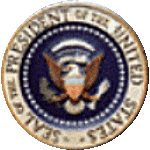

Andrew Jackson
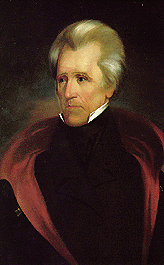
During the Revolutionary War, Andrew Jackson was captured by the British. He
and his brother Robert had joined the Continental Army the year before, when
Andrew was just 13 years old. When a British officer ordered the young
prisoner to clean his boots, Andrew refused. The officer slashed the boy's
hand and face with a sword. Jackson bore the scars of that attack all his
life.
From his youth, Andrew Jackson was proud and hot-tempered, known to fight
anyone who dared to insult him. He was born in a log cabin on the frontier.
His parents had left Ireland to settle in the Carolinas. Both had died
before Jackson was 15 years old. Young Andrew had to grow up quickly.
As a young man, Jackson studied law in North Carolina. He later settled in
Tennessee, where he married Rachel Donelson Robards.
While still in his 20s, Jackson was elected to Congress. Then, during the
War of 1812, the governor of Tennessee appointed him major general. Jackson
defeated the Creek Indians at Horseshot Bend and in 1814 forced them to give
up vast amounts of land in Georgia and Alabama. In 1815, he marched to the
defense of New Orleans and won a stunning victory when the British attacked.
The Battle of New Orleans made Jackson a national hero.
In 1817, President Monroe ordered Jackson to respond to raids by the
Seminole Indians in Florida. Jackson exceeded his orders by not only
defeating the Seminoles, but capturing the Spanish city of Pensacola. Spain
then sold Florida to the United States for $5 million.
Jackson's nicknames told something about his character. The Creeks called
him "Sharp Knife." His own men gave him another name -- "Old
Hickory." To them, he was as hard and tough as the wood of a hickory
tree. The name stuck even after he became President.
Jackson first ran for President in 1824, but the three Democratic candidates
split the vote and the House of Representatives voted John Quincy Adams
President. Jackson ran against Adams again in 1828, and this time he won.
Andrew Jackson was the first President who was neither a rich Virginia
plantation owner nor a successful Boston lawyer. His supporters hailed his
election as a victory for the common man. He was an energetic, combative
President who would occasionally throw spectacular temper tantrums to bully
people into getting his own way. He also fired many government employees,
replacing them with his own supporters. While other Presidents had used the
"spoils system" before, no one exploited it as much as Andrew
Jackson.
Like many westerners, Jackson disliked the Bank of the United States,
believing it favored wealthy, powerful easterners. When Congress tried to
recharter the Bank, Jackson vetoed the bill. Then he ordered the federal
government to withdraw its funds from the Bank. These funds were deposited
in banks controlled by Jackson's supporters. Although Jackson's actions
against the national bank were popular with the vast majority of the public,
they indirectly helped to cause the financial Panic of 1837.
Jackson's administration was a disaster for Native Americans. The Indian
Removal Act of 1830, which Jackson supported, forced Native Americans off
their lands in exchange for territory west of the Mississippi River that
white citizens did not want. Federal troops forced 15,000 Cherokees on a
trek from Georgia to present-day Oklahoma, a fatal journey now known as
"The Trail of Tears."
Jackson decided not to run for a third term and retired to his plantation
near Nashville, Tennessee. His own finances floundered during the Panic of
1837, and he suffered from several medical problems as he aged, including
tuberculosis. He died on June 8, 1845.
During the Revolutionary War, Andrew Jackson was captured by the British. He
and his brother Robert had joined the Continental Army the year before, when
Andrew was just 13 years old. When a British officer ordered the young
prisoner to clean his boots, Andrew refused. The officer slashed the boy's
hand and face with a sword. Jackson bore the scars of that attack all his
life.
From his youth, Andrew Jackson was proud and hot-tempered, known to fight
anyone who dared to insult him. He was born in a log cabin on the frontier.
His parents had left Ireland to settle in the Carolinas. Both had died
before Jackson was 15 years old. Young Andrew had to grow up quickly.
As a young man, Jackson studied law in North Carolina. He later settled in
Tennessee, where he married Rachel Donelson Robards.
While still in his 20s, Jackson was elected to Congress. Then, during the
War of 1812, the governor of Tennessee appointed him major general. Jackson
defeated the Creek Indians at Horseshot Bend and in 1814 forced them to give
up vast amounts of land in Georgia and Alabama. In 1815, he marched to the
defense of New Orleans and won a stunning victory when the British attacked.
The Battle of New Orleans made Jackson a national hero.
In 1817, President Monroe ordered Jackson to respond to raids by the
Seminole Indians in Florida. Jackson exceeded his orders by not only
defeating the Seminoles, but capturing the Spanish city of Pensacola. Spain
then sold Florida to the United States for $5 million.
Jackson's nicknames told something about his character. The Creeks called
him "Sharp Knife." His own men gave him another name -- "Old
Hickory." To them, he was as hard and tough as the wood of a hickory
tree. The name stuck even after he became President.
Jackson first ran for President in 1824, but the three Democratic candidates
split the vote and the House of Representatives voted John Quincy Adams
President. Jackson ran against Adams again in 1828, and this time he won.
Andrew Jackson was the first President who was neither a rich Virginia
plantation owner nor a successful Boston lawyer. His supporters hailed his
election as a victory for the common man. He was an energetic, combative
President who would occasionally throw spectacular temper tantrums to bully
people into getting his own way. He also fired many government employees,
replacing them with his own supporters. While other Presidents had used the
"spoils system" before, no one exploited it as much as Andrew
Jackson.
Like many westerners, Jackson disliked the Bank of the United States,
believing it favored wealthy, powerful easterners. When Congress tried to
recharter the Bank, Jackson vetoed the bill. Then he ordered the federal
government to withdraw its funds from the Bank. These funds were deposited
in banks controlled by Jackson's supporters. Although Jackson's actions
against the national bank were popular with the vast majority of the public,
they indirectly helped to cause the financial Panic of 1837.
Jackson's administration was a disaster for Native Americans. The Indian
Removal Act of 1830, which Jackson supported, forced Native Americans off
their lands in exchange for territory west of the Mississippi River that
white citizens did not want. Federal troops forced 15,000 Cherokees on a
trek from Georgia to present-day Oklahoma, a fatal journey now known as
"The Trail of Tears."
Jackson decided not to run for a third term and retired to his plantation
near Nashville, Tennessee. His own finances floundered during the Panic of
1837, and he suffered from several medical problems as he aged, including
tuberculosis. He died on June 8, 1845.
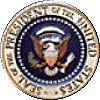
Martin Van Buren
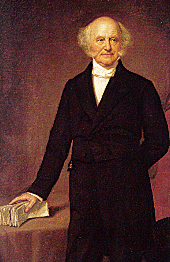
Martin Van Buren began to practice law at age 21. Intelligent and ambitious,
he wasted no time plunging into law and politics.
Martin Van Buren was a short stocky man with a cheerful, outgoing
personality. He practiced law and served in the New York legislature before
being elected to the Senate in 1821. During his Senate term, he became one
of President John Quincy Adams's chief opponents. Van Buren wanted a
President of Jefferson's democratic principles. He soon decided Andrew
Jackson would be that kind of President.
Van Buren was an energetic supporter of Jackson in the election of 1825.
When Jackson won, he asked his friend to become Secretary of State. Van
Buren was one of the few Jackson cabinet members who never quarreled with
the hot-tempered President. Jackson won reelection in 1832 and Van Buren
became Vice President.
When Jackson decided not to seek a third term, he designated Van Buren to be
his successor. Though he was not a crowd-pleasing politician like Jackson,
Van Buren had the advantage of running against three Whig candidates in
1934. The Whigs hoped the vote would be so split that no candidate would
receive a majority of the votes and the election would be thrown into the
House of Representatives. Instead, the three Whigs split the vote of their
own supporters and Van Buren won a majority.
Only two months after Van Buren was inaugurated, the nation was rocked by
the Panic of 1837. Hundreds of banks closed, and at one time, 90 percent of
the nation's factories shut down. Hungry people rioted as the first major
economic depression seized the nation. A Jeffersonian democrat, Van Buren
believed that the government should take as little action as possible.
"The less the government interferes with private pursuits," he
said, "the better for the general prosperity."
Needless to say, Van Buren's popularity plummeted, and his political
opponents seized the opportunity to denounce him. It took several years for
the economy to recover -- not fast enough to help Van Buren win reelection.
William Henry Harrison defeated him in the election of 1840. Van Buren tried
to regain the presidency in 1844 and 1848, but failed. He eventually retired
to his mansion in Kinderhook, New York, where he died of asthma and heart
failure in 1862.

William Henry Harrison
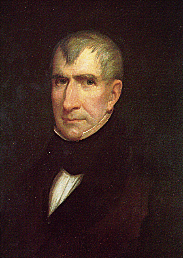
William Henry Harrison gave the longest inauguration speech of any President
-- 1 hour, 40 minutes -- and had the shortest term of office -- a mere
month!
As a young man, William Henry Harrison studied to be a doctor, but in 1791
when his father died and family finances tightened, he joined the army. In
1798, Harrison fought Native Americans in the Northwest Territory and served
as governor of the Indiana Territory from 1801 to 1812. He became known both
for his treaties with Native Americans and for his ability to fight them in
war.
In 1811, Harrison decided to march with 1,000 soldiers on a Native American
town founded by Shawnee chief Tecumseh and his brother, the Prophet, on
Tippecanoe Creek. While Tecumseh was away trying to unite Indian groups
against whites, the Prophet attacked Harrison's troops. Harrison's victory
earned him the nickname "Old Tippecanoe."
In the War of 1812, Harrison led a force into Canada where he defeated a
combined British and Indian army at the Battle of the Thames River. Tecumseh
died in the fighting. The victory made Harrison a national hero.
After the war, Harrison entered politics and became a member of Congress for
Ohio in 1816, an Ohio state senator in 1819, and a member of the United
States Senate in 1825. President John Quincy Adams made him ambassador to
Colombia in 1828.
Harrison was one of the Whig candidates who unsuccessfully tried to defeat
Martin Van Buren in 1836. Though he lacked a defined campaign platform, he
ran again in 1840. Aided by an economic depression that was blamed on Van
Buren, Harrison won the election.
At age 68, Harrison was the oldest President elected up to that time. After
delivering a long inaugural speech on a rainy day, he caught a cold which
developed into pneumonia. The entire nation was shocked when, just one month
later, Harrison died.

All images of Presidents are courtesy of whitehouse.gov
Information taken from Software titled "American Heritage The History of
the United States for Young People.
The copyright belongs to: Forbes
Inc. and Byron Preiss Multimedia Company. Thank You!

Washington, Adams, Jefferson
Madison, Monroe, Adams
Jackson, Van Buren, Harrison
Tyler, Polk, Taylor
Fillmore, Pierce, Buchanan
Lincoln, Johnson, Grant
Hayes, Garfield, Arthur
Cleveland, Harrison, Cleveland
McKinley, T. Roosevelt, Taft
Wilson, Harding, Coolidge
Hoover, F. Roosevelt, Truman
Eisenhower, Kennedy, Johnson
Nixon, Ford, Carter
Reagan, Bush, Clinton
Bush, ????, ????
|

|
All graphics and
pages are copyright © 1997 - 2008 Pages 4 Ever
(except where noted). Do not take, copy, steal, plagiarize or use in any
way, shape or format without the express written permission of Pages
4 Ever.
Some backgrounds and graphics made from clipart acquired from ArtToday, Boxed Art,
friends, my own imagination, and/or
graphic CD collections that I have purchased. If you find anything on this site
that you have copyright to, and can prove it, please let me know and I will
gladly either remove it or place a link back to you, whichever you prefer.
If you should find any broken links, please drop us a line and let us know the
exact URL the broken link is on. Thank you.
|

|
![]()





